Deborah Swift's Blog, page 51
May 3, 2011
The Tuesday Tip - the reader loves to snoop
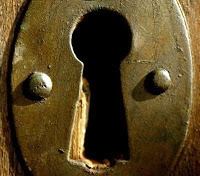 Who doesn't love a secret?
Who doesn't love a secret? Create interesting characters by giving them a secret or intrigue that they don't want people to know about. Characters need skeletons in the closet, buried emotional wounds, hidden needs and shameful pasts. These are what keeps the reader engaged, creating tension and an urge to delve deeper into the characters background and personality.
A book is a wonderful excuse to be nosy and snoop in a way that is unacceptable in everyday life. It is the one thing a book can offer that real life does not – we can probe the underlying motivations of fictional characters in a way we dare not attempt with our real-life acquaintances, friends or lovers.
Published on May 03, 2011 08:54
May 2, 2011
Incomers 1592
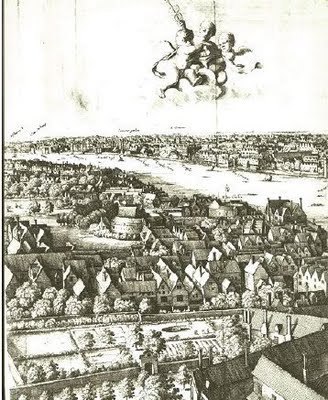 At the end of the 16th century London had become such a popular place to live that Elizabeth banned any more building.
At the end of the 16th century London had become such a popular place to live that Elizabeth banned any more building.The Act of 1592 says there are
"great Mischiefes and Inconveniences" from the habit of dividing up houses "into several Tenements or Dwellings". Because of this overpopulation it was hard to find food or fuel - after all coal had to be brought in by boat from elsewere, and there were few trees left standing. The document says
"great Infection of Sickness and dearth of Victuals and Fuel hath growen and ensued."
Elizabeth was also concerned about the kind of incomers that were making their way to the city.
"Many idle vagrant and wicked Persons have harboured themselves there and divers remote places of the Realme have been disappointed of Workmen and dispeopled."
The solution? Just as we are preserving the countryside with our Green Belt laws, a law was passed forbidding any more building
"That noe person (shall) henceforth make and erect any newe Building or Buildings House or Houses for Habitation or dwelling within either of the said cities [of London and Westminster] or within three miles of any of the Gates."
Of course the law had no effect whatever, and by the time of the Restoration, the city had stretched to Piccadilly and beyond.
Which is just as well, for by the time my two incomers - Sadie and Ella Appleby from Westmorland - arrive in 1661, it is a veritable warren of tenements and rookeries, alleyways and ginnels. The Gilded Lily tells how the sisters hope they will be able to hide from their pursuers. But the London underworld is full of beggars and ne'er-do-wells who will sell their soul for a penny, and they soon find there is no-one they can trust.
Not even each other.
Published on May 02, 2011 11:27
April 26, 2011
The Tuesday Tip - The Absence of Things
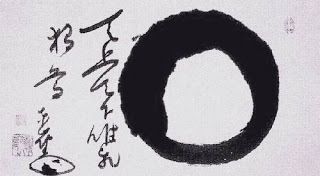 At Art College I remember we did the lovely standard exercise where we drew the spaces around an object. This then revealed the object more clearly than drawing the outline of the thing itself, precisely because it by-passed the preconceptions we might already have about the object's shape. The Chinese philosophers and Zen calligraphers urge us to pay attention to what is missing,
At Art College I remember we did the lovely standard exercise where we drew the spaces around an object. This then revealed the object more clearly than drawing the outline of the thing itself, precisely because it by-passed the preconceptions we might already have about the object's shape. The Chinese philosophers and Zen calligraphers urge us to pay attention to what is missing,Thirty spokes on a cartwheel
Go towards the hub that is the centre
- but look, there is nothing at the centre
and that is precisely why it works!
If you mould a cup you have to make a hollow:
It is the emptiness within it that makes it useful.
In a house or room it is the empty spaces
-the doors, the windows that make it useable.
They all use what they are made of
to do what they do,
but without their nothingness they would be nothing.
Tao Te Ching - Man-Ho Kwok, Jay Ramsay, Martin Palmer Translation.
Sometimes it is more effective to describe something in terms of what is not there than in terms of what is. A setting could be described in terms of what is not there instead of what is. This is particularly effective with describing characters too; what is missing from their personalities can be what makes them what they are. Describing what is absent taps into the lack that lies at the heart of us, and so draws the reader in.
Published on April 26, 2011 01:51
April 24, 2011
A greener clean
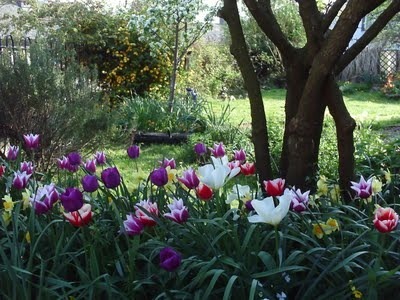
When I was researching The Lady's Slipper I came across a reference to people cleaning pewter in the 17th century with Goosegrass. The plant was apparently very common in this area, and used in vast quantities. Try as I might I could not see much of it in the hedgerows and concluded it must sadly be rarer now in these parts than it was back then - until just this week.
I have inherited a beautiful garden from the previous owners of my house, full of beautiful tulips and apple blossom. We have had sunny weather the last few weeks so I have taken to weeding. And which is the most common weed in my garden? Yes, Goosegrass. It's everywhere, and as fast as I pull it up, the more of it sprouts.
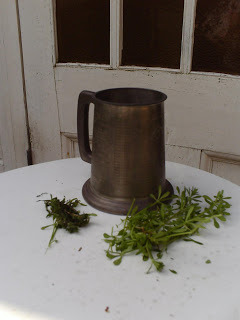 We recently found an old pewter tankard in the loft which I wanted to keep out on display as it lists all the Kings and Queens of England from Alfred the Great (871 - 904) right up to Elizabeth II (1952 -) -nearly 60 of them! It was looking a bit old and tarnished so I thought I'd better try out the pewter polishing the old way. So here is a picture of the tankard before.......and after! The 17th century folk must have been at it for hours, because I polished quite vigorously and I have to say the Goosegrass didn't do much except disintegrate and make my fingers green. I can imagine Ella the maid's frustration at the amount of effort this might take!
We recently found an old pewter tankard in the loft which I wanted to keep out on display as it lists all the Kings and Queens of England from Alfred the Great (871 - 904) right up to Elizabeth II (1952 -) -nearly 60 of them! It was looking a bit old and tarnished so I thought I'd better try out the pewter polishing the old way. So here is a picture of the tankard before.......and after! The 17th century folk must have been at it for hours, because I polished quite vigorously and I have to say the Goosegrass didn't do much except disintegrate and make my fingers green. I can imagine Ella the maid's frustration at the amount of effort this might take!It did give me an interesting sense of how much longer people must have taken over their daily chores though in those days, and led me to take a little more time in peeling the potatoes today by taking the whole bowl into the garden so I could take my time and enjoy the view - rampant Goosegrass and all.
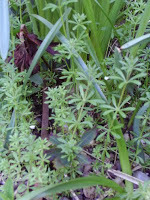 You might know goosegrass by another name - Cleavers, Clithers, Robin run-in-the-grass, Burweed, Loveman, Mutton chops, Clite, Clide, Clitheren, and Goosebill, from the sharp, serrated leaves, like the rough-edged mandibles of a goose. In the 19th century Goosegrass used to be known by the nickname of Beggar's lice, from clinging closely to the garments of passers by and because the small burs resemble these creatures. It is also known to some as Harriff, or, Erriff, from the Anglo-Saxon "hedge rife," a taxgather, or robber, because it plucks the wool from the sheep as they pass too.
You might know goosegrass by another name - Cleavers, Clithers, Robin run-in-the-grass, Burweed, Loveman, Mutton chops, Clite, Clide, Clitheren, and Goosebill, from the sharp, serrated leaves, like the rough-edged mandibles of a goose. In the 19th century Goosegrass used to be known by the nickname of Beggar's lice, from clinging closely to the garments of passers by and because the small burs resemble these creatures. It is also known to some as Harriff, or, Erriff, from the Anglo-Saxon "hedge rife," a taxgather, or robber, because it plucks the wool from the sheep as they pass too. Below - cleaning pots and pans in 17th century Holland - can't spot any Goosegrass here, and they both look quite cheerful, in fact the woman on the right looks like she might be singing as she works. Notice the fine ladies in the backgound, gossiping away whilst the work goes on.
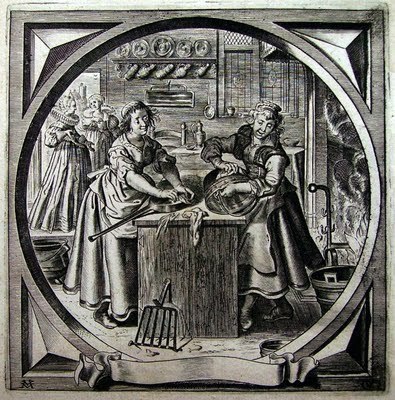
Published on April 24, 2011 10:06
April 20, 2011
The bookshop from heaven
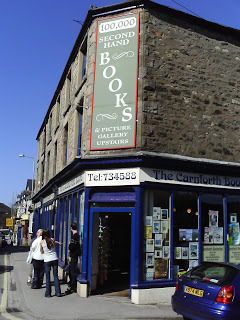 Welcome SheWriters from the blog hop.
Welcome SheWriters from the blog hop.I have recently moved house to a lovely historic village, and our nearest small town is only five minutes drive away. Having spent a few weeks heaving boxes of books and then trying to find shelf-space for them all, I vowed to buy less books.
No sooner had I said this than I went to the supermarket in our local town and almost next door was this - Aargh! the lovely Carnforth bookshop with its 14 higgledy-piggledy rooms of 100,000 second hand books! As you can see, the door is wide open, and who could resist? When I got inside I found there is coffee on the boil and a downstairs section with new books. You can even buy the gift-wrap and cards if you want to buy a book as a present, or for the musical - indulge in reams of sheet music.
Needless to say, I was in there more than an hour (the appropriate for Lent idea of "shall I try giving up buying books" forgotten) and I came out with three books. As an antidote to internet buying, it is a true bookaholic's browsing experience. Particularly delightful is a room of hardback fiction all at £1.
Though I have to say the writer in me is reluctant to buy second hand as I know how much work goes into a book and how the royalties from it stack up, but I forgive the Carnforth bookshop as it has a very good section of new fiction that you come to first before going upstairs to the used books.
As a reader of course I can't resist cheap second hand books, and the smell of leather and old paper. And the charm of exploring narrow stairways and inter-connecting rooms all stacked floor-to-ceiling with mostly one-offs.
Guess I'll be needing a few more shelves.
And if you are searching for a rare out of print book, why not try them www.carnforthbooks.co.uk
Published on April 20, 2011 06:58
Lost Followers
If there is anyone out there who knows how to get the icons of my followers back, please let me know! They just disappeared one day into the ether and now there is a hole in my blog where all the pictures should be. Try as I might I can't find what to click on to get them back. Any clues anyone, or has everyone sunk without trace forever into the Bermuda Triangle of blogging?
Published on April 20, 2011 03:12
April 19, 2011
Tuesday Tip - Rejections
Jonathan Livingston Seagull by Richard Bach 140 rejections
Because of Winn-Dixie by Kate DiCamillo 397 rejections (and it became a film) - (Wow - she was persistent!)
Watership Down by Richard Adams 26 rejections
A Wrinkle in Time by Madeleine L'Engle 97 rejections (and it won the Newbery Medal for best children's book of 1963; it's now in its 69th printing)
Cinder Edna by Ellen Jackson 40 rejections (and it has won multiple awards and sold 150,000 hard copies).
The Princess Diaries by Meg Cabot 17 rejections
Gone with the Wind by Margaret Mitchell 38 rejections
Dune by Frank Herbert 20 rejections
etc etc
Rejections are demoralizing, painful and hard to take. The best advice someone gave me after my book had been rejected by 10 publishers was, "believe in yourself and get on and write the next."
I took the advice, and was able to escape the feeling of failure (even if only temporarily) by immersing myself in a new imaginative world. It didn't make the rejections go away but by the time the next book was half-way done, the first had found its publisher.
Statistics are pinched from the excellent writing website of Mary Carroll Moore:
http://howtoplanwriteanddevelopabook.blogspot.com/
Because of Winn-Dixie by Kate DiCamillo 397 rejections (and it became a film) - (Wow - she was persistent!)
Watership Down by Richard Adams 26 rejections
A Wrinkle in Time by Madeleine L'Engle 97 rejections (and it won the Newbery Medal for best children's book of 1963; it's now in its 69th printing)
Cinder Edna by Ellen Jackson 40 rejections (and it has won multiple awards and sold 150,000 hard copies).
The Princess Diaries by Meg Cabot 17 rejections
Gone with the Wind by Margaret Mitchell 38 rejections
Dune by Frank Herbert 20 rejections
etc etc
Rejections are demoralizing, painful and hard to take. The best advice someone gave me after my book had been rejected by 10 publishers was, "believe in yourself and get on and write the next."
I took the advice, and was able to escape the feeling of failure (even if only temporarily) by immersing myself in a new imaginative world. It didn't make the rejections go away but by the time the next book was half-way done, the first had found its publisher.
Statistics are pinched from the excellent writing website of Mary Carroll Moore:
http://howtoplanwriteanddevelopabook.blogspot.com/
Published on April 19, 2011 05:24
April 14, 2011
Still unpublished? First Chapter competition
 Great work still has no home? Dust off those manuscripts and give them a final polish.
Great work still has no home? Dust off those manuscripts and give them a final polish.Lightship First Chapter competition - Deadline 30th June 2011
Win a year of expert mentoring from an author, literary agent and editor, and have your finished novel published by Alma books.
http://www.lightshippublishing.co.uk/
Published on April 14, 2011 08:02
April 10, 2011
Tuesday Tip - book trailers, interview with author Cynthia Neale
Book Trailers are all the rage at the moment. If you are writing a book, then I suppose now is the time to start collecting images or material to make a trailer for your next book. If you want to have a go yourself, there is a link at the end of the interview.
Never seen a book trailer? Here's a very good example. I met Cynthia Neale in the historical fiction group on She Writes. Her debut novel, Norah, about an Irishwoman in 19th century New York is just out.
I asked Cynthia:
What made you decide to have a book trailer?
Cynthia: My publisher, Lucky Press, recommended doing a book trailer. She is very progressive and there are other Lucky Press authors with book trailers that I took a look at. And then I also went on She Writes and looked at book trailers. I felt that if done professionally, a book trailer can be a great marketing tool. I had shivers watching a couple of book trailers and wrote down the titles of the books to buy in the future.
Did you do it yourself, or did someone else do it for you? If the latter, what sort of discussions did you have about its content?
My friend's son, Nathan Sorrentino, is a student at Geneseo College in New York State and he created a video for a course that caught the attention of Google who asked him to do some work for them. They live in Rochester, NY and when I visited there in October, we had dinner and brainstormed what kind of trailer I would like. He would do it for the experience and as a friend and I would give him a "tip." We e-mailed back and forth for a couple of months. I wrote up the text and he gave me links to music downloads with a one-time use fee (minimal). He found some images himself in archival material and I sent him photos of landscapes in Ireland I had taken in 2008. Nathan understood the legal requirements and the technical aspects of making this video, but he also could fathom the heart of what I wanted to relay in the video. He advised doing some tweaks here and there. I edited the text a few times and sent it to my publisher who also did some tweaks on my texts. Nathan is a talented young man and anyone who would like him to do a book trailer, should contact him. His information is on the credits at the end of the trailer.
Where did you source the images for the trailer, and how did you go about finding the music?
The sources are listed in the credits of the trailer. I listened to a lot of the music on various sites. I have a lot of Irish music I listen to and dance to, but I didn't want to go about getting permission, etc. I had even thought of asking some musician friends to play for the video, but time was of the essence. It took quite a few hours for me to pick out just the right music for the video, but I felt quite pleased with deciding on the tunes I found. And the cost was only about $30.00!
What sort of feedback have you had about the trailer and has it raised interest in your book?
Since the trailer went up mid-January, there has been nearly 1500 hits and many positive comments. Comments from some people in other countries, including Ireland. As an American writer, I wanted to be delicate, but strong, about the subject of The Great Hunger. I was not born in Ireland and many of the Irish-born still have a good deal of angst over this event in their history. I found that it was necessary to include the background (my first book material) of An Gorta Mor to make it understood what was at stake for the Irish, and especially Norah McCabe, to have immigrated to a city such as New York. I have had positive feedback from the Irish-born and from everyone who has viewed the trailer. Now...for a screenwriter!
Thank you Cynthia. Very best of luck with "Norah."
Review
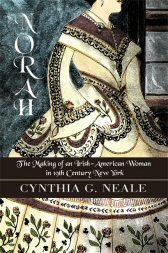 Norah is a story of a young immigrant woman battling hardship, poverty and prejudice in New York in the 1850's. It has obviously been lovingly researched. The portraits of Norah Mc Cabe and her family are beautifully drawn, and we catch most of the character of Norah from the attitudes of her Mam and Da who want the best for her but are unable to understand just how far she wants to climb. Cynthia Neale is particularly good at getting inside the minds of her characters to understand their motivations. This is her first novel for adults, previously she has written books for children.
Norah is a story of a young immigrant woman battling hardship, poverty and prejudice in New York in the 1850's. It has obviously been lovingly researched. The portraits of Norah Mc Cabe and her family are beautifully drawn, and we catch most of the character of Norah from the attitudes of her Mam and Da who want the best for her but are unable to understand just how far she wants to climb. Cynthia Neale is particularly good at getting inside the minds of her characters to understand their motivations. This is her first novel for adults, previously she has written books for children.
Make no mistake, although at times the language is breathtakingly lyrical, this tells it like it was, grit and all. All the hard facts of life for an Irish immigrant are between these pages; poor housing, the bordellos, street fights, and the cut and thrust of the gang underworld. At a time when to be black made you a second-class citizen, the book raises the question of what forms a person's identity, particularly for a white minority such as the Irish in New York.
Da discusses black equality with Norah:
"We all feel inferior, Norah."
"We all feel inferior? The Irish? Or all human beings?"
At times this novel is rather documentary in style, and it is certainly not the usual run-of-the-mill historical, but I can highly recommend it as a slice of real life for anyone with an interest in this period of New York history, particularly those with family or connections to Ireland.
Fancy making your own book trailer? Here's how with the excellent article by Brenda Coulter.
http://www.gather.com/viewArticle.action?articleId=281474977019853
Never seen a book trailer? Here's a very good example. I met Cynthia Neale in the historical fiction group on She Writes. Her debut novel, Norah, about an Irishwoman in 19th century New York is just out.
I asked Cynthia:
What made you decide to have a book trailer?
Cynthia: My publisher, Lucky Press, recommended doing a book trailer. She is very progressive and there are other Lucky Press authors with book trailers that I took a look at. And then I also went on She Writes and looked at book trailers. I felt that if done professionally, a book trailer can be a great marketing tool. I had shivers watching a couple of book trailers and wrote down the titles of the books to buy in the future.
Did you do it yourself, or did someone else do it for you? If the latter, what sort of discussions did you have about its content?
My friend's son, Nathan Sorrentino, is a student at Geneseo College in New York State and he created a video for a course that caught the attention of Google who asked him to do some work for them. They live in Rochester, NY and when I visited there in October, we had dinner and brainstormed what kind of trailer I would like. He would do it for the experience and as a friend and I would give him a "tip." We e-mailed back and forth for a couple of months. I wrote up the text and he gave me links to music downloads with a one-time use fee (minimal). He found some images himself in archival material and I sent him photos of landscapes in Ireland I had taken in 2008. Nathan understood the legal requirements and the technical aspects of making this video, but he also could fathom the heart of what I wanted to relay in the video. He advised doing some tweaks here and there. I edited the text a few times and sent it to my publisher who also did some tweaks on my texts. Nathan is a talented young man and anyone who would like him to do a book trailer, should contact him. His information is on the credits at the end of the trailer.
Where did you source the images for the trailer, and how did you go about finding the music?
The sources are listed in the credits of the trailer. I listened to a lot of the music on various sites. I have a lot of Irish music I listen to and dance to, but I didn't want to go about getting permission, etc. I had even thought of asking some musician friends to play for the video, but time was of the essence. It took quite a few hours for me to pick out just the right music for the video, but I felt quite pleased with deciding on the tunes I found. And the cost was only about $30.00!
What sort of feedback have you had about the trailer and has it raised interest in your book?
Since the trailer went up mid-January, there has been nearly 1500 hits and many positive comments. Comments from some people in other countries, including Ireland. As an American writer, I wanted to be delicate, but strong, about the subject of The Great Hunger. I was not born in Ireland and many of the Irish-born still have a good deal of angst over this event in their history. I found that it was necessary to include the background (my first book material) of An Gorta Mor to make it understood what was at stake for the Irish, and especially Norah McCabe, to have immigrated to a city such as New York. I have had positive feedback from the Irish-born and from everyone who has viewed the trailer. Now...for a screenwriter!
Thank you Cynthia. Very best of luck with "Norah."
Review
 Norah is a story of a young immigrant woman battling hardship, poverty and prejudice in New York in the 1850's. It has obviously been lovingly researched. The portraits of Norah Mc Cabe and her family are beautifully drawn, and we catch most of the character of Norah from the attitudes of her Mam and Da who want the best for her but are unable to understand just how far she wants to climb. Cynthia Neale is particularly good at getting inside the minds of her characters to understand their motivations. This is her first novel for adults, previously she has written books for children.
Norah is a story of a young immigrant woman battling hardship, poverty and prejudice in New York in the 1850's. It has obviously been lovingly researched. The portraits of Norah Mc Cabe and her family are beautifully drawn, and we catch most of the character of Norah from the attitudes of her Mam and Da who want the best for her but are unable to understand just how far she wants to climb. Cynthia Neale is particularly good at getting inside the minds of her characters to understand their motivations. This is her first novel for adults, previously she has written books for children.Make no mistake, although at times the language is breathtakingly lyrical, this tells it like it was, grit and all. All the hard facts of life for an Irish immigrant are between these pages; poor housing, the bordellos, street fights, and the cut and thrust of the gang underworld. At a time when to be black made you a second-class citizen, the book raises the question of what forms a person's identity, particularly for a white minority such as the Irish in New York.
Da discusses black equality with Norah:
"We all feel inferior, Norah."
"We all feel inferior? The Irish? Or all human beings?"
At times this novel is rather documentary in style, and it is certainly not the usual run-of-the-mill historical, but I can highly recommend it as a slice of real life for anyone with an interest in this period of New York history, particularly those with family or connections to Ireland.
Fancy making your own book trailer? Here's how with the excellent article by Brenda Coulter.
http://www.gather.com/viewArticle.action?articleId=281474977019853
Published on April 10, 2011 12:56
April 7, 2011
Tiny cathedral windows that sing
 Up until the 17th century there were no real guitars - the only instruments similar to a guitar were the lute and, in Spain, where my new work in progress is set, the vilhuela.
Up until the 17th century there were no real guitars - the only instruments similar to a guitar were the lute and, in Spain, where my new work in progress is set, the vilhuela.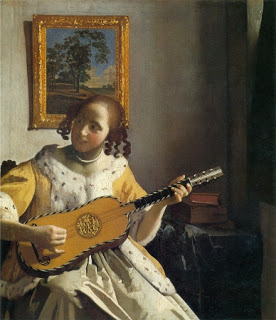 In the early 17th century the Guitarra Morrisco became popular in Spain in the Moorish areas where what we know now as flamenco guitar and dance began. This type of guitar spread to other European countries where it became known as the Baroque Guitar or sometimes simply the Spanish Guitar.
In the early 17th century the Guitarra Morrisco became popular in Spain in the Moorish areas where what we know now as flamenco guitar and dance began. This type of guitar spread to other European countries where it became known as the Baroque Guitar or sometimes simply the Spanish Guitar. A good example of this sort of Baroque guitar can be seen in Vermeer's painting "The Guitar Player."
Also evident here is the inlaid decorative edge and "rose" or fretwork, which was a feature of this period in many instruments. In the 17th century there were specific craftsmen who made a living carving this sort of decorative panel. They are so beautiful and intricate.
They are crafted from of wood, or for the more detailed ones, parchment, cut in ornamental layers to give a three dimensional effect.
You can click on the picture below to see more examples. I am almost tempted to invent a "rose" carver just so that I can feature a description of someone making one of these, but unfortunately I already have quite a few craftsmen populating my novel already!
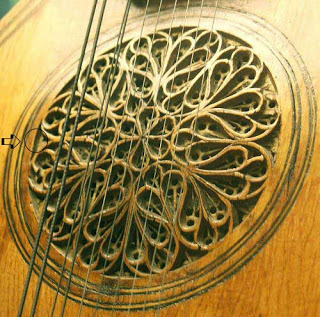 The designs are similar to those of "rose" windows such as in the great cathedrals, but in miniature.
The designs are similar to those of "rose" windows such as in the great cathedrals, but in miniature.As it is, the Spanish guitarist is a "bit-player" in my cast of characters - nevertheless, I think the look and feel of the guitar is important to the book, and I love this sort of research.
Published on April 07, 2011 07:46



